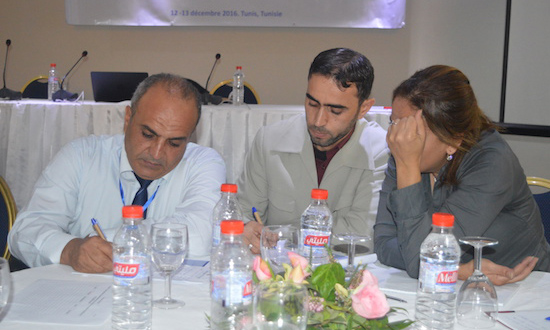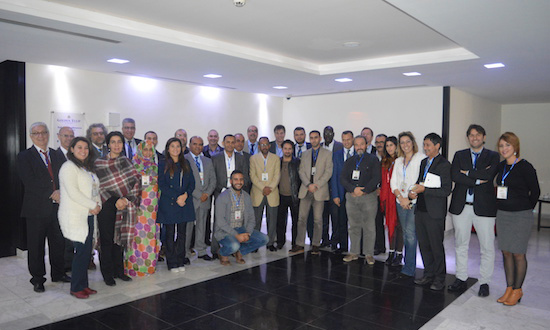


In line with the recommendations of the Joint Permanent Committee (JPC) of the Mediterranean Animal Health Network (REMESA in French: REseau MEditerranéen de Santé Animale) held in Algiers (Algeria) on 24-25 November 2015 and in Toledo (Spain) on 10-11 May 2016), the OIE Sub-Regional Representation for North Africa and the FAO Subregional Office for North Africa jointly organised in Tunis (Tunisia) on 12-13 December 2016 a “Regional Workshop on Animal Identification and Traceability: Tools for Animal Genetic Resources Management, Product Traceability and Disease Control”.
The general objectives of the workshop were:
A total of 25 representatives from 5 North African countries (Algeria, Libya, Morocco, Mauritania and Tunisia) attended this workshop. This workshop brought together veterinary officers, as well as representatives of professional livestock organisations. For each country, invitations were sent to: the REMESA focal point in epidemiology (REPIVET), the REMESA focal point in socio-economy (RESEPSA), the focal point for animal genetic resources, and a representative of a professional organisation of cattle-breeders.
Mr. Badi Besbes (representative of FAO Headquarters) and Pr Salah Hammami, (member of the OIE Terrestrial Animal Health Standards Commission) presented respectively FAO and OIE approaches to animal identification and traceability of animals and products as well as management of genetic resources by highlighting the benefits deriving when such system is in place. The state of play of measures implemented or in process in these fields was presented by each country. The organisers also invited experts from France and Italy to share their experiences in the field of animal identification. The expert from France could not attend the meeting and his presentation was delivered by Dr Jocelyn Mérot (Programme Officer at the OIE Sub-Regional Representation for North Africa). The two experts from Italy, Dr Luigi Possenti and Dr Andrea Vitelli (IZSAM Teramo), gave presentations about their experience in animal identification and database management as well as their experience in the framework of the EU/Algeria twinning project for the animal identification component. On the second day of the workshop, working group sessions were organised in order to analyse the regulatory framework and the animal identification and traceability systems in the Maghreb countries, and to make recommendations to strengthen collaboration at the regional level, with a view to eventually adopt a harmonised regional approach to the identification, traceability, management of animal movements and management of animal genetic resources. One of the main recommendations was to establish a working group composed by one focal point from each country in order to elaborate a document containing general principles and definitions that are common to all countries in order to lay the foundation for future projects. In this respect, it was considered to explore in the future the possibility of building a cooperation programme EU / North Africa – similar to what was done in Algeria – with the aim of establishing a system for the identification and traceability of animals and animal products at the regional level.
All pictures © Dr Farouk Ben Rhaiem (AssEV) 2016, unless mentioned otherwise.
Group photograph. Picture © Dr Farouk Ben Rhaiem (AssEV) 2016.


